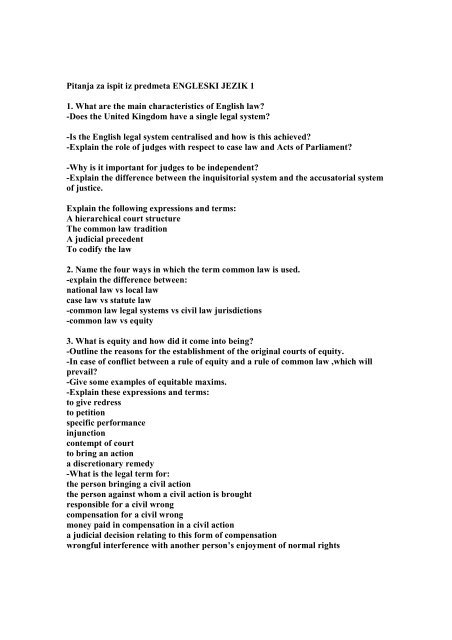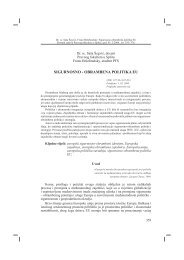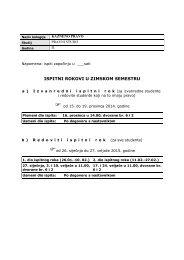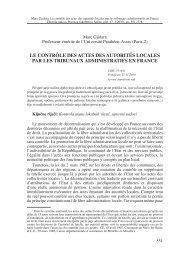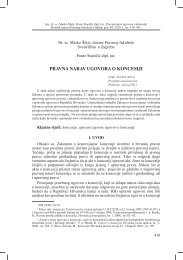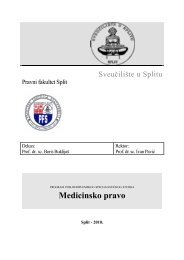Pitanja za ispit iz predmeta ENGLESKI JEZIK 1 What are the main ...
Pitanja za ispit iz predmeta ENGLESKI JEZIK 1 What are the main ...
Pitanja za ispit iz predmeta ENGLESKI JEZIK 1 What are the main ...
Create successful ePaper yourself
Turn your PDF publications into a flip-book with our unique Google optimized e-Paper software.
<strong>Pitanja</strong> <strong>za</strong> <strong>ispit</strong> <strong>iz</strong> <strong>predmeta</strong> <strong>ENGLESKI</strong> <strong>JEZIK</strong> 11. <strong>What</strong> <strong>are</strong> <strong>the</strong> <strong>main</strong> characteristics of English law?-Does <strong>the</strong> United Kingdom have a single legal system?-Is <strong>the</strong> English legal system centralised and how is this achieved?-Explain <strong>the</strong> role of judges with respect to case law and Acts of Parliament?-Why is it important for judges to be independent?-Explain <strong>the</strong> difference between <strong>the</strong> inquisitorial system and <strong>the</strong> accusatorial systemof justice.Explain <strong>the</strong> following expressions and terms:A hierarchical court structureThe common law traditionA judicial precedentTo codify <strong>the</strong> law2. Name <strong>the</strong> four ways in which <strong>the</strong> term common law is used.-explain <strong>the</strong> difference between:national law vs local lawcase law vs statute law-common law legal systems vs civil law jurisdictions-common law vs equity3. <strong>What</strong> is equity and how did it come into being?-Outline <strong>the</strong> reasons for <strong>the</strong> establishment of <strong>the</strong> original courts of equity.-In case of conflict between a rule of equity and a rule of common law ,which willprevail?-Give some examples of equitable maxims.-Explain <strong>the</strong>se expressions and terms:to give redressto petitionspecific performanceinjunctioncontempt of courtto bring an actiona discretionary remedy-<strong>What</strong> is <strong>the</strong> legal term for:<strong>the</strong> person bringing a civil action<strong>the</strong> person against whom a civil action is broughtresponsible for a civil wrongcompensation for a civil wrongmoney paid in compensation in a civil actiona judicial decision relating to this form of compensationwrongful interference with ano<strong>the</strong>r person’s enjoyment of normal rights
17.Give an example of a case in which <strong>the</strong> literal rule was applied and a briefsummary of its application.<strong>What</strong> criticisms can be levelled at <strong>the</strong> literal rule?18. Explain <strong>the</strong> basic recommendations of <strong>the</strong> Law Commission’s report on <strong>the</strong>interpretation of statutes.-Give two examples of <strong>the</strong> presumptions used by <strong>the</strong> courts when interpretingstatutes.19. Explain <strong>the</strong> distinction between civil and criminal courts and give an account of<strong>the</strong> structure of <strong>the</strong> English Courts based on this distinction.20. Distinguish between courts of first instance and appellate courts and give anaccount of <strong>the</strong> structure of <strong>the</strong> English courts based on this distinction.-<strong>What</strong> <strong>are</strong> <strong>the</strong> alternative terms for a court of first instance: a court of___________jurisdiction; a court of _______________-<strong>What</strong> expressions <strong>are</strong> used to refer to <strong>the</strong> possibility of an appeal?-<strong>What</strong> is <strong>the</strong> term used for <strong>the</strong> party who appeals?-<strong>What</strong> is <strong>the</strong> term used for <strong>the</strong> o<strong>the</strong>r party?21. <strong>What</strong> is <strong>the</strong> purpose of <strong>the</strong> civil courts?-How <strong>are</strong> <strong>the</strong> differences between particular types of disputes reflected in <strong>the</strong> courtsystem?-Describe <strong>the</strong> county court arbitration scheme.22. <strong>What</strong> is <strong>the</strong> purpose of <strong>the</strong> criminal courts?-<strong>What</strong> is <strong>the</strong> burden of proof in (a) civil actions;(b) criminal actions?-Who can start criminal proceedings?-Distinguish between <strong>the</strong> three types of criminal offence and describe <strong>the</strong> procedurefor trying <strong>the</strong>m.-<strong>What</strong> is <strong>the</strong> role of <strong>the</strong> magistrates in trying each of <strong>the</strong>se offences?-Distinguish between ‘discharge’ and ‘acquittal’,
23. Distinguish between in-court and extra-court adjudication and describe <strong>the</strong> two<strong>main</strong> forms of extra-court adjudication.24. <strong>What</strong> <strong>are</strong> <strong>the</strong> three situations when a judge is said to be making law?25. Discuss <strong>the</strong> independence of <strong>the</strong> judiciary.26. Describe <strong>the</strong> function of <strong>the</strong> jury.-How many cases go for jury trial?-Who can qualify for jury service?-Explain <strong>the</strong> process of jury vetting and <strong>the</strong> process of jury challenge.-Who issued guidelines on jury vetting?-Why might jurors dislike jury service?27. <strong>What</strong> <strong>are</strong> shadow juries?28. Define <strong>the</strong> terms per incuriam and distinguishing.29. Why <strong>are</strong> financial limits an arbitrary way of distinguishing between cases.30. Distinguish between lay magistrates and stipendary magistrates.31. Which civil actions may be heard before a jury?32. <strong>What</strong> <strong>are</strong> two important classifications of English Law?-Describe <strong>the</strong> <strong>main</strong> differences between criminal law and civil law?-Give some examples of how <strong>the</strong> distinction between criminal and civil law isreflected in <strong>the</strong> terminology and procedure.


